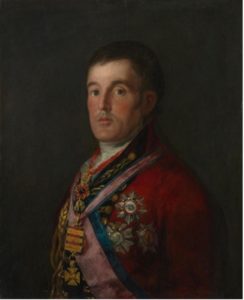Endurance, Character and Hope
I admit that I was not looking forward to reading Leadersmithing: Revealing the Trade Secrets of Leadership by Eve Poole. I figured it would be yet another book on leadership that doesn’t really apply to me because I don’t hold a traditional leadership role.
Then Poole opens with a reference to Goya and his portrait of the Duke of Wellington.[i] My interest is piqued.
Is this guy the very model of a modern Major-General or what? But, war-hero though he may be, he doesn’t solve my leadership problem because I am nothing like him. I still do not have a typical “leader-y” role. I certainly don’t have that many medals.
Thankfully, Poole doesn’t conclude that piles of military honors equate to leadership skill. In her Tedx Talk, she starts reading from Romans 5:3-4. “We rejoice in our sufferings, knowing that suffering produces endurance, and endurance produces character, and character produces hope…” Now she has my attention. A leadership schema that teaches us to rejoice in our hardships? This is not something I’ve heard before.
As it turns out, Poole’s theological education continues to shine through her work while interweaving a solid grounding in neurobiology. Using the example of Claude Monet, she talks about stages of learning. Early on, Monet’s paintings resembled those of his contemporaries at the Salon. Only as he grew and developed as a painter was he able to give the world “haystacks and Giverny” as Poole puts it.[iii]
Poole is talking about leaders following an apprenticeship program of sorts, but I couldn’t stop thinking about our spiritual growth. Some of my earliest memories are of copying others as they prayed, worshipped, memorized Scripture. As I grew up, my faith was very real to me but when it came to the nuts and bolts, I was still just copying what I saw. When I was probably 11 or so, I participated for the first time in the Maundy Thursday Love Feast which included a symbolic foot-washing. I remember my mom talking me through what to expect, but basically her advice boiled down to “Just watch what the person next to you is doing and do the same.”
By God’s grace, I’ve moved far beyond that copy-and-paste faith. My current worship practice bears little resemblance to the tradition I grew up in. With the help of the Holy Spirit, I am able to live out my faith in a way that is genuinely my own and can contribute something unique to this world. Thanks be to God!
The connections between leadership development and theology don’t stop there. Poole also addresses character development, calling it the “acquisition of a skill like any other.” I’m still trying to wrap my head around this. Is exercising faith, hope and love, among others, really just like practicing the piano?
If I apply this to my current ministry, what are the virtues or areas of character that I would like to develop? Sacrificial hospitality, a willingness to be interrupted and graciously handling conflict come to mind. What would it look like to “practice” in these areas?
Maybe this is what Paul is getting at in 1 Corinthians 9:24-27. “Do you not know that in a race all the runners run, but only one gets the prize? Run in such a way as to get the prize. Everyone who competes in the games goes into strict training. They do it to get a crown that will not last, but we do it to get a crown that will last forever. Therefore I do not run like someone running aimlessly; I do not fight like a boxer beating the air. No, I strike a blow to my body and make it my slave so that after I have preached to others, I myself will not be disqualified for the prize.” Eric Wakeling calls it “suffering on purpose”.[vi] Most people call it discipline.
The final area I want to highlight is Poole’s discussion of service to the point of burn-out, especially in the name of faith. She says, “I know some clergy who think that their job is to use themselves up in service of others. It has even got a fancy theological name – kenosis, or self-emptying. But I think this is a confusion and, at its worst, it has a lot more to do with ego than with selflessness. Yes, you are special and unique, but other people are also special and unique and are also called to serve, whether in the religious life, through volunteering, or through their work or caring.”[vii] Without naming any names, I might know someone who is guilty of this. Yes, obviously, I mean me.
I struggle to find the balance between self-sacrifice in humility while still maintaining some semblance of boundaries and emotional health. Christ emptied himself and even gave up his life, yet we also see that during his 3 years of public ministry he did not heal every single person he encountered. This is a real point of tension for me in this current season. Any words of wisdom are very welcome!
In an attempt to weave my thoughts together, I’ll return to Romans 5. Life and leadership are not meant to be easy. The challenges and the “struggles produce endurance, and endurance produces character, and character produces hope.” And hope is something I can hold on to.
_______________________
[i] Poole, Eve. Leadersmithing: Revealing the Trade Secrets of Leadership. London: Bloomsbury Publishing Plc, 2017. 7.
[ii] Francisco de Goya, The Duke of Wellington, 1814, Oil on mahogany, The National Gallery in London, accessed February 13, 2023, https://www.nationalgallery.org.uk/paintings/francisco-de-goya-the-duke-of-wellington.
[iii] Poole, Eve. Leadersmithing: Revealing the Trade Secrets of Leadership. London: Bloomsbury Publishing Plc, 2017. 65.
[iv] Claude Monet, Bridge Over a Pond of Water Lilies, 1899, Oil on canvas, The Metropolitan Museum of Art in New York City, accessed February 13, 2023, https://www.metmuseum.org/art/collection/search/437127.
[v] Italian (Umbrian) Painter, The Theological Virtues: Faith, Charity, Hope, ca. 1500, Tempura and gold on wood, The Metropolitan Museum of Art in New York City, accessed February 13, 2023, https://www.metmuseum.org/art/collection/search/436761.
[vi] Wakeling, Eric. God Joy: Finding Freedom from Guilt and Strength in Suffering. Santa Ana: Calvary Church, 2022.
[vii] Poole, Eve. Leadersmithing: Revealing the Trade Secrets of Leadership. London: Bloomsbury Publishing Plc, 2017. 31.
[viii] Menczel, Linda Saskia, Kenosis Sculpture, 2017, Bronze on bronze. Accessed February 13, 2023, https://www.saatchiart.com/art/Sculpture-Kenosis/770159/3524365/view.
7 responses to “Endurance, Character and Hope”
Leave a Reply
You must be logged in to post a comment.




Hi Kim, You had me at Romans 5 and Monet.
I went to see Poole on Ted Talks…https://www.youtube.com/watch?v=73L1613KDnw
I enjoyed her comment about 20/20 hindsight becoming 20/20 Foresight and how leadership happens when everything goes wrong.
The book provided me with a different look at leadership. Having lived overseas for about 30 years I don’t have much experience in US church administration or church leadership. So it was fun to see the plethora of leadership characteristics that she lays out for Diamonds, Spades, Hearts and Clubs. I enjoyed her Critical Incidents and used it as an evaluation tool for my own style of leadership.
Fort better or worst, the last leadership test I took put me in the “Benevolent Dictator” category, Think of the movie the “God father.” sigh.
Her Critical Incidents will help me to reshape how I think and act out Leadership. Thanks for your comments…Shalom…Russ
Hi Kim, Thanks for posting the artwork in your blog! Reading Poole’s book made wish she supplied some pictures so I could fully grasp what she was describing.
I like your questions! “…what are the virtues or areas of character that I would like to develop? Sacrificial hospitality, a willingness to be interrupted and graciously handling conflict come to mind. What would it look like to “practice” in these areas?” Sacrificial hospitality stood out to me. Can you tell me more about that and why that is an important virtue for you to practice? It sounds both welcoming and challenging.
Good question, Jenny. This has been one I’ve wrestled with in both healthy and unhealthy ways for years. I can think of two (healthy, I think) reasons sacrificial hospitality is important to me. First, the communal nature of church, i.e. church is so much more than just a worship meeting on Sunday. We’re always looking for ways to “do life” together outside of Sunday worship, so for our family that often involves opening up our home. Second, Acts 2 and James 2. If I see a fellow believer in need I have a duty to provide. This has meant feeding, housing and paying for immigration lawyers on behalf of a few church members over the years. There’s also one very unhealthy reason I struggle with this – I compare myself to our teammates who are amazing in this area. At one point they had at least 5 refugee teenagers living with them and on the weekends the soup kitchen/shelter didn’t provide services so about 20 more teenagers slept on their living room floor.
Kim, I deeply resonate with your “struggle to find the balance between self-sacrifice in humility while still maintaining some semblance of boundaries and emotional health.” I had a conversation with my wife this very afternoon about me wrestling through this very thing (though not in those words). It had to do with a very real sense of being overwhelmed and falling behind in my current role. I felt the tension of wanting to respond to a couple of items that I probably do not have to step in to “solve.” Thank you for reminding us that even Jesus didn’t heal everyone (or solve every problem he encountered) in his 3-year public ministry.
On another note, if you were to outline your “rule of life” in what you describe as your non “leader-y” role, I wonder what you would pass along to someone in an apprentice role…someone who was perhaps watching and learning from you in your “contributing something unique”… If I’m not making sense in my question, just let me know.
Travis, “rule of life” makes me think of a couple different things, so I’ll share them and hopefully one of them will respond to your question. In terms of spiritual disciplines or practice, I’m still working this out, but since reading Peter Scazzerro’s work I’ve started observing 4 brief moments per day to intentionally turn my eyes back to Jesus. Then, I have all sorts of other routines like quarterly spiritual retreats. But another meaning of “rule of life” can also be almost like a personal mission statement, a north star to keep oneself on track. In this sense, I love the mission statement from our Anglican church in Illinois: Loving God, Loving Others, Loving Life. More specifically this season of life has led me to such “north stars” as integrity, whole-hearted living and living out of Kingdom values. But that’s just me…what advice would I give to an apprentice? Invest time in knowing yourself (emotional intelligence) so that you can live with integrity (be the person you say you want to be). No easy task to maintain day-to-day!
Kim,
Like Travis, I was drawn to your comment: “I struggle to find the balance between self-sacrifice in humility while still maintaining some semblance of boundaries and emotional health.” This, too, has been a wrestling point for me through the years as ministry has many opportunities die to self and give…and give…and give again. You noted Peter Scazzero’s book which is very helpful in this area. I find that there is a difference between being motivated by guilt and being motivated by the Holy Spirit to go the extra mile. How do you lean in to discerning which is which?
Kim, I always enjoy reading your posts…so deep…so real…so Christ-like. Thank you! How would graciously handling conflict in your sphere of influence cause you to continue to be a humble leader?